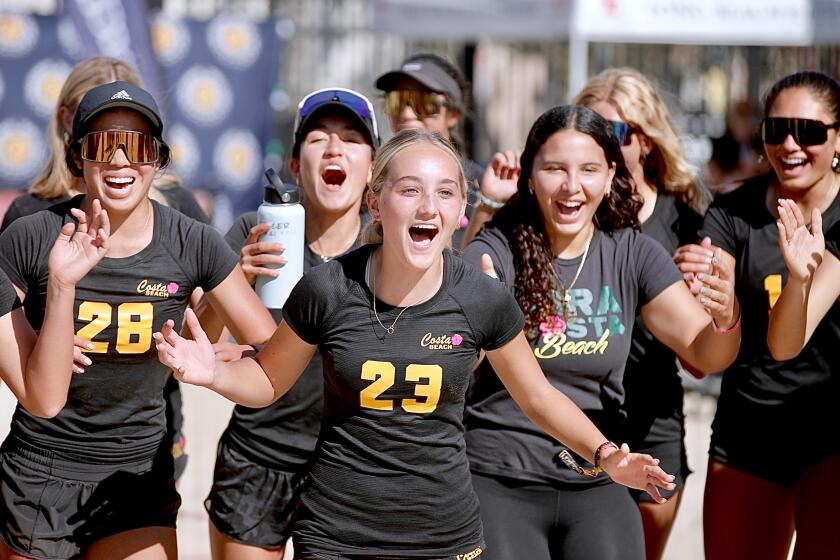‘Marathon’ Had Boston Written All Over It
- Share via
Headline writers called it the Boston Marathon. Many basketball fans called it, simply, the greatest basketball game ever played.
It happened 23 years ago tonight at the Boston Garden.
It was Game 5 of the NBA finals, Boston vs. Phoenix, and its finish in three overtimes left players, coaches and fans so drained that Celtic Coach Tom Heinsohn nearly keeled over.
The Celtics, who had blown a 16-point second-half lead, led in the second overtime, 109-106, with 10 seconds left. But Dick Van Arsdale made an 18-footer and three seconds later Paul Westphal stole the ball and Curtis Perry made another 18-footer to give the Suns a 110-109 lead.
Then John Havlicek made a wild bank shot as the horn sounded to apparently end the game. While Boston Garden fans surged wildly onto the court and the Celtics ran off to the locker room, the Suns stayed put, knowing that in the last two minutes of overtime the clock is stopped until the ball is passed in bounds.
Order was restored. Then Phoenix Coach John MacLeod called a timeout, knowing he had none.
His strategy was to give up a probable point on the technical foul free throw, then get one more shot for a tie from a half-court inbounds play.
Incredibly, it worked.
Jo Jo White made the free throw. Phoenix got the ball to Garfield Heard, who made a top-of- the-key jumper with Don Nelson’s hand in his face.
Boston won the game the third overtime, 128-126, surviving two Westphal steals in the final seconds.
Heinsohn, as he spoke to writers afterward, asked to see the team doctor, saying he felt faint.
In Phoenix, two days later, Boston won the title, 87-80.
Also on this date: In 1958, Los Angeles held possibly its most-anticipated election in history. It was Proposition B on the ballot, which, if approved, would permit the Dodgers to build their $12-million stadium in Chavez Ravine. It passed, by a wide margin, causing business leader H.C. McClellan to say: “It’s the best baseball deal for a city since Yankee Stadium was built in 1923.” Taxpayer groups and lawsuits slowed the start of construction, but the stadium was completed for the 1962 season. . . . In 1964, Sandy Koufax faced the minimum 27 hitters and pitched his third no-hitter, a 3-0 gem at Philadelphia. He lost a perfect game in the fourth inning by walking Richie Allen, who was erased on a double play.
More to Read
Go beyond the scoreboard
Get the latest on L.A.'s teams in the daily Sports Report newsletter.
You may occasionally receive promotional content from the Los Angeles Times.










